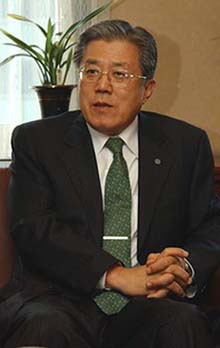Hanjin-backed Coal Plant in Subic Bay Opposed
SUBIC BAY — Opposition is growing to the construction of a 300 megawatt coal power plant on the pristine beaches of Subic Bay, one of the Philippines' top tourist destinations.
The power plant, being built by Taiwan Cogen, a subsidiary of Taiwan Power Corp., primarily to serve the needs of Korean shipbuilder Hanjin, will bring the controversial form of power generation to one of the country's most diverse environments.
Subic Bay is home to more than 70 species of fish, including important varieties of reef fish. The world's rare and endangered Olive Ridley turtle and Hawksbill dwell still survive in Subic Bay . The area is also blanketed by a 9,000 hectare virgin triple-canopy rainforest that provides the area with some of the highest air quality in the region.

President Park Jung-Won of hanjin Shipping Co. Courtesy of Hankyung
Under the current proposal, this spectacular natural setting will be host to one of the most polluting types of energy production available. According to the environmental group, Greenpeace, coal is a form of energy that pollutes comprehensively, from the time the coal is extracted, to its transportation across the sea or land, to the pollutants it pumps into the atmosphere.
"Fly ash samples taken from coal fired power plants in the Philippines and Thailand over the course of the last three years have shown the presence of hazardous substances such as mercury and arsenic," the group said in a statement. "Laboratory and technical analysis indicate that a far greater amount of these toxins is likely being released to the environment and thus pose huge risks to population centers."
"Mercury is capable of causing severe brain damage in developing fatueses, tremors, mental disorders and death," the group continued. "It is so toxic that it takes only 1/70th of a teaspoon to contaminate a 10.11 hectare lake to the point that fish caught in the lake are considered unfit for human consumption."
Business groups and resort owners in the area have reacted with outrage to the proposal to bring such a facility into an area that counts tourism as its lifeblood.
The Subic Bay Freeport Chamber of Commerce, the Subic Bay Resorts Association, as well as other groups have said that the plant's operation would cause irreversible damage to the area.
"It will pollute the air, the land and the water, removing the key ingredients in Subic Bay 's prime assets — clean air, clean water and the proximity to nature," the groups said in a statement.
The above story was provided from Save Subic
The power plant, being built by Taiwan Cogen, a subsidiary of Taiwan Power Corp., primarily to serve the needs of Korean shipbuilder Hanjin, will bring the controversial form of power generation to one of the country's most diverse environments.
Subic Bay is home to more than 70 species of fish, including important varieties of reef fish. The world's rare and endangered Olive Ridley turtle and Hawksbill dwell still survive in Subic Bay . The area is also blanketed by a 9,000 hectare virgin triple-canopy rainforest that provides the area with some of the highest air quality in the region.

President Park Jung-Won of hanjin Shipping Co. Courtesy of Hankyung
Under the current proposal, this spectacular natural setting will be host to one of the most polluting types of energy production available. According to the environmental group, Greenpeace, coal is a form of energy that pollutes comprehensively, from the time the coal is extracted, to its transportation across the sea or land, to the pollutants it pumps into the atmosphere.
"Fly ash samples taken from coal fired power plants in the Philippines and Thailand over the course of the last three years have shown the presence of hazardous substances such as mercury and arsenic," the group said in a statement. "Laboratory and technical analysis indicate that a far greater amount of these toxins is likely being released to the environment and thus pose huge risks to population centers."
"Mercury is capable of causing severe brain damage in developing fatueses, tremors, mental disorders and death," the group continued. "It is so toxic that it takes only 1/70th of a teaspoon to contaminate a 10.11 hectare lake to the point that fish caught in the lake are considered unfit for human consumption."
Business groups and resort owners in the area have reacted with outrage to the proposal to bring such a facility into an area that counts tourism as its lifeblood.
The Subic Bay Freeport Chamber of Commerce, the Subic Bay Resorts Association, as well as other groups have said that the plant's operation would cause irreversible damage to the area.
"It will pollute the air, the land and the water, removing the key ingredients in Subic Bay 's prime assets — clean air, clean water and the proximity to nature," the groups said in a statement.
The above story was provided from Save Subic







0 Comments:
Post a Comment
<< Home